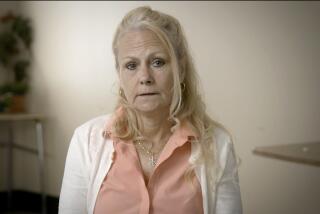Woman Imprisoned for Killing 2nd Husband Charged in Death of 1st
- Share via
WINNSBORO, S.C. — A half-page coroner’s report in 1967 ruled the death of Ronald “Little Red” Beasley a suicide, but his father, K.C. “Red” Beasley, never believed it.
Neither did Beasley’s good friend, Herman Young. When Young became Fairfield County sheriff 25 years later, he reopened the moribund case and slapped some grease on the wheels of justice.
Now Little Red’s former wife, who remarried and is imprisoned in Virginia for murdering that second husband, faces trial here for killing her first one as well.
“It was in the back of my mind all those years that Red could not have done that. There was no way,” Young said recently.
In July 1967, Little Red’s wife, Frances Beasley, told police he loaded a .22-caliber rifle and fired at her, then put the rifle in his mouth and blew his brains out.
But 29-year-old Little Red had suffered a stroke a few months earlier. He could neither walk nor feed himself and wore diapers, and he required round-the-clock care, Young said.
Even so, the handwritten report by then-Coroner Earl Bowler, a barber, was clear: “No inquest demanded. No inquest held. Death caused by self-inflicted wound.”
That didn’t stop the rumors flying around this rural town of 3,500 that Mrs. Beasley had grown tired of caring for her disabled husband and killed him. The day before Little Red died, his father recalls, Frances Beasley told her mother-in-law that she didn’t want to spend the rest of her life cleaning up after Little Red.
Young, a pallbearer at the funeral, described driving to the house afterward to let Frances know he would help her however he could.
“When I drove up on the yard, they were inside having a party. He had just been buried,” the sheriff said. “I just sat in the yard and cried like a baby.”
Family members never pressured authorities for a further investigation for fear that Frances would cut them off from their 11-month-old grandson, Red Beasley said. “We didn’t feel we could get any justice in this little town.”
Current Coroner Joe Silvia says the family was probably right.
“Back then, this was a good ol’ boys town,” he said. “I’m positive it wasn’t an outright case of covering up a murder. People just didn’t do anything about it.”
Frances Beasley married Jerry Truesdale about a month after Little Red’s death. They moved to Virginia. In 1988, Truesdale died in a highway shooting while his wife was with him in their van near Roanoke.
Frances Beasley Truesdale told Truesdale’s family that someone in a passing car shot him, but she told police her husband pulled over, got out and was shot.
At the hospital, she told Truesdale’s sister, Anne Letrick, that he was shot with a .22-caliber handgun, yet the bullet was still in his brain.
Virginia investigators found other inconsistencies. They learned Truesdale had actually been prone when shot, apparently napping in the back of the van. But there were no bloodstains on the upholstery because a sheet of plastic had been placed under the quilt he was lying on.
Police charged Mrs. Truesdale with killing her husband to collect his insurance. In February 1992, she was convicted of second-degree murder and sentenced to 20 years in prison. Now 54, Mrs. Truesdale recently refused to speak with a reporter.
Letrick, who was in fourth grade when her brother married, said she heard all her life that Jerry’s new wife had killed her first husband. Neighbors in Winnsboro talked about it, her teachers talked about it, the family even asked her brother about it. “He got really mad,” she said. “He never believed it. He loved her.”
Letrick kept notes from every conversation she had with her sister-in-law and pressured South Carolina authorities to reopen Little Red’s case. “If she would’ve been convicted of killing Little Red Beasley, my brother would still be alive,” she says now.
What Virginia State Police homicide De. Barry Keesee discovered in Winnsboro during the Truesdale murder investigation convinced him that Frances Beasley Truesdale had killed Little Red too.
In 1989, Keesee gave his files to Leroy I. Montgomery, then the sheriff of Fairfield County. Although the sheriff concluded Little Red had not killed himself, he said he did not have enough evidence to bring charges.
But Winnsboro Police Capt. Bobby Byrd says that once Mrs. Truesdale was convicted and he asked Montgomery to reopen the case, the sheriff “had a natural-born fit about it.”
Byrd thinks Montgomery did not want his father, S. Leroy Montgomery, who was sheriff in 1967, to look bad. Montgomery says his father, with only five deputies compared with 48 now, did the best he could.
A Fairfield County grand jury indicted Mrs. Truesdale for murder in January. The case should make it to trial next month, according to the county prosecutor’s office.
Red Beasley, now 80 and in failing health, is waiting.
“We didn’t get any justice then,” Beasley said. “I’d like to see it tried and disposed of while I’m still alive.”
More to Read
Sign up for Essential California
The most important California stories and recommendations in your inbox every morning.
You may occasionally receive promotional content from the Los Angeles Times.












